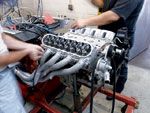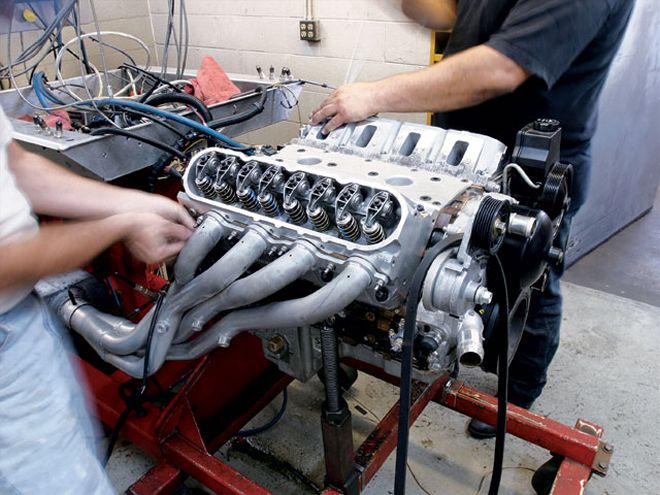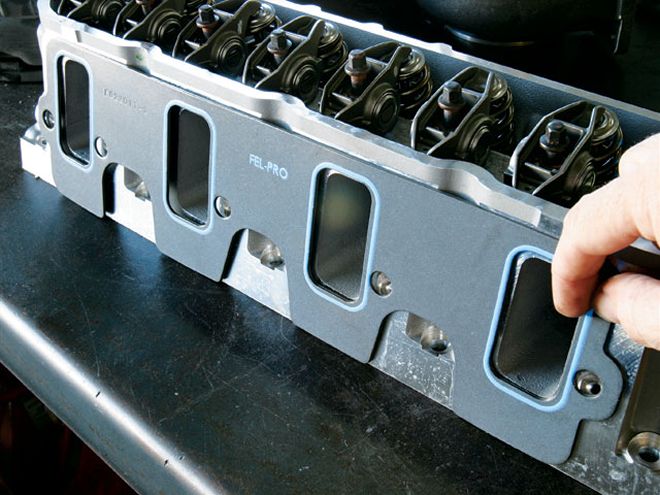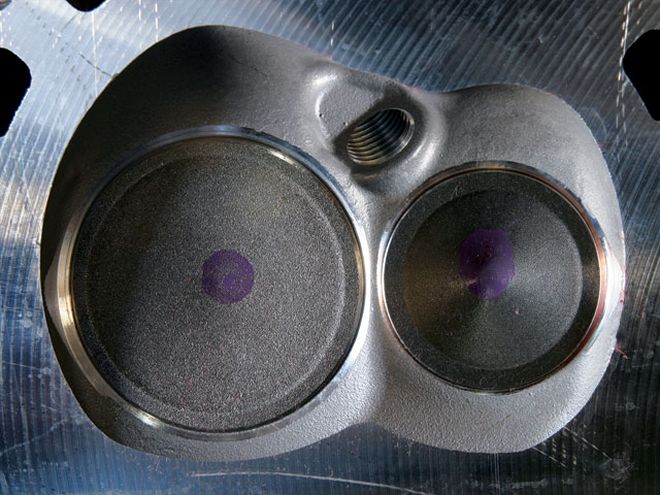
 All we did was bolt on a mild Comp Cams hydraulic roller cam and a pair of the GM L92 aluminum heads to a stock iron 6.0L short-block and came up with 550 hp.
All we did was bolt on a mild Comp Cams hydraulic roller cam and a pair of the GM L92 aluminum heads to a stock iron 6.0L short-block and came up with 550 hp.
The ante has just been raised. What we have here is a junkyard 6.0L engine with stock production L92 heads, a not-so-big hydraulic roller cam, and an 850-cfm carburetor that makes an astonishing 1.5 hp/ci. We're talking 550 hp from a very streetable 364 ci of Gen III small-block. Best of all, you could replicate this engine for under $4,900. We know of lots of supercharged small-blocks that don't make this kind of power on the best of days. If you're a player, this is the new hot hand, and the best part is it doesn't require high-roller stakes to play.
Last month, we baselined this engine with a GMPP Hot cam using the stock, iron 6.0L heads, and it made a stout 483 hp. That was all a setup for this month's story, where we unbolted the stock, iron heads and bolted on a set of stock, factory L92 heads that are basically monster rectangle-port heads that flow over 300 cfm right out of the box. We'll get into more detail on these L92 heads, but the important thing is that for $1,050, you can buy a pair of these heads and their requisite valvetrain parts, bolt them on to a Gen III 6.0L just like we did, and rock 'n' roll.
There are a couple of important points you must address to accomplish this swap, but it's quick and easy and the power is amazing. Read on and find out how.
 The L92 aluminum heads are very easy to spot with their rectangular intake ports. The intake ports flow 320 cfm right out of the box. The larger intake port also necessitated a new intake gasket, available from Fel-Pro.
The L92 aluminum heads are very easy to spot with their rectangular intake ports. The intake ports flow 320 cfm right out of the box. The larger intake port also necessitated a new intake gasket, available from Fel-Pro.
The New Sherriff In Town
If you have your headset tuned in to chatroom buzz, then perhaps you've heard about the L92 heads. They are production, rectangle-port, aluminum heads being used on the new 6.2L GM truck engines for 2007. At first, this may seem like a "Who cares?" We're telling you that you can't afford not to care because these heads flow 320 cfm using monstrous 2.165-inch intake valves. Think of them as baby Rat motor rectangle-port heads without the canted valves and you get the idea. They also retain the Gen III 15-degree valve angles and are in the area of the same flow as the much-touted LS7 CNC-ported intakes, although the Corvette heads use even steeper 12-degree valve angles. The large L92 intake ports do give up some torque at lower engine speeds because of their size, but the peak flow and subsequent peak horsepower numbers are so good, give the GM engineers and their management team a big thumbs-up for producing such outstanding cylinder heads. The best part is that these heads are available right now through any GM dealer in the country. We obtained our test heads from Scoggin-Dickey Parts Center, where you can buy an identical assembled pair for $800 complete with the 2.165/1.59-inch valves, stock valvesprings, retainers, and keepers all ready to bolt on.
 The intake valve is a massive 2.165 inches in diameter, while the exhaust is relatively tame at 1.59 inches. The combustion chamber measures 70 cc.
The intake valve is a massive 2.165 inches in diameter, while the exhaust is relatively tame at 1.59 inches. The combustion chamber measures 70 cc.
These heads are intended for the new Gen IV LS2 engine that uses a larger 4.00-inch bore, which means the L92s' large intake valves will not clear smaller bores, hence our choice for the more budget-oriented 6.0L engine. Plus, the L92 heads use specific rectangular-shaped intake ports that are much wider and shorter than the older Gen III cathedral intake ports. The new intake port demanded an offset intake rocker arm to maintain decent geometry between the rocker arm and the hydraulic roller lifter. We had to purchase new rockers, stands, and all the hardware, but the GM prices are surprisingly low. We obtained all the additional production GM valvetrain parts, including a set of stiffer LS6 valvesprings, from Scoggin-Dickey for roughly $250, which puts the entire cylinder-head and valvetrain cost at just over $1,000. Think about that: We're talking about 15-degree aluminum small-block cylinder heads that flow 320 cfm at a cost of roughly a grand including rockers and springs. It's the steal of the century.
Because the L92 heads use the stock Gen III 15-degree valve angle, we didn't have to worry about custom valve reliefs in the pistons. The combustion-chamber size is right at 70 cc, which, according to GM's information, is within 1 cc of the stock LQ4 aluminum heads, so the static compression ratio remains the same. Other than their rather large cross-sectional port areas that sacrifice some torque, there is very little to criticize about these heads. And they make some amazing horsepower.
Parts ListDescriptionPNSourcePriceLQ4, iron 6.0L, usedN/ALKQ Auto $1,{{{100}}}.00L92 aluminum head, complete, 212582713Scoggin-Dickey798.50Rocker arms, intake, 812569167Scoggin-Dickey70.00Rocker arms, exhaust, 810214664Scoggin-Dickey70.00Rocker support stand, 812600936Scoggin-Dickey11.98Rocker-arm bolts, 812560961Scoggin-Dickey61.92Valvesprings, kit, LS6 (16)12499224Scoggin-Dickey 52.25GMPP L92 carb intake25534401Scoggin-Dickey299.50Fel-Pro LQ4 head gasket1027{{{Summit}}} Racing41.95Fel-Pro intake gasket, L921222-2Summit Racing N/A Flow-Chart Comparison Factory L92 head